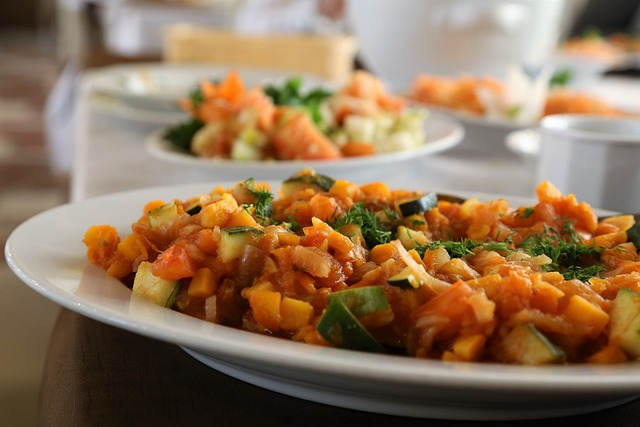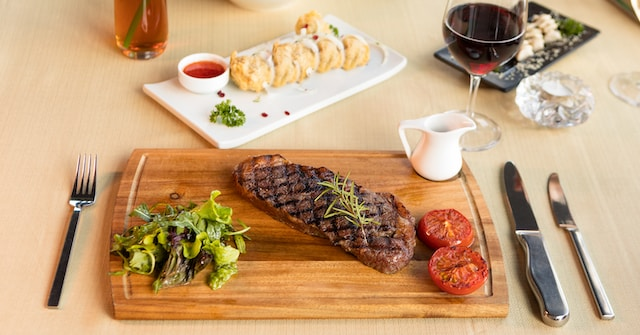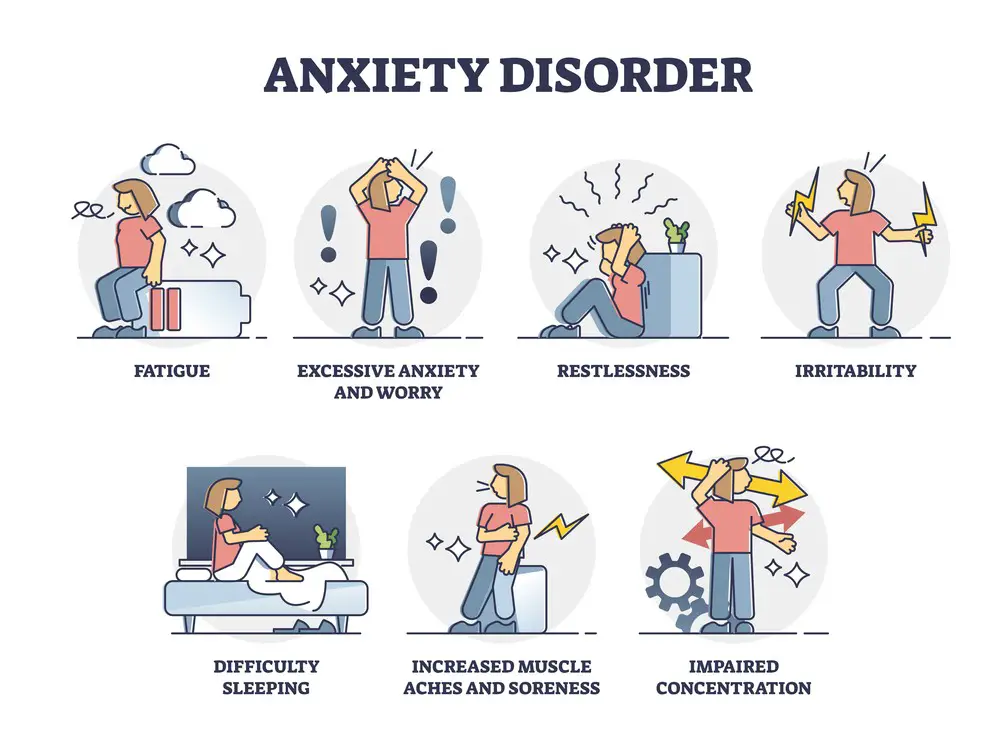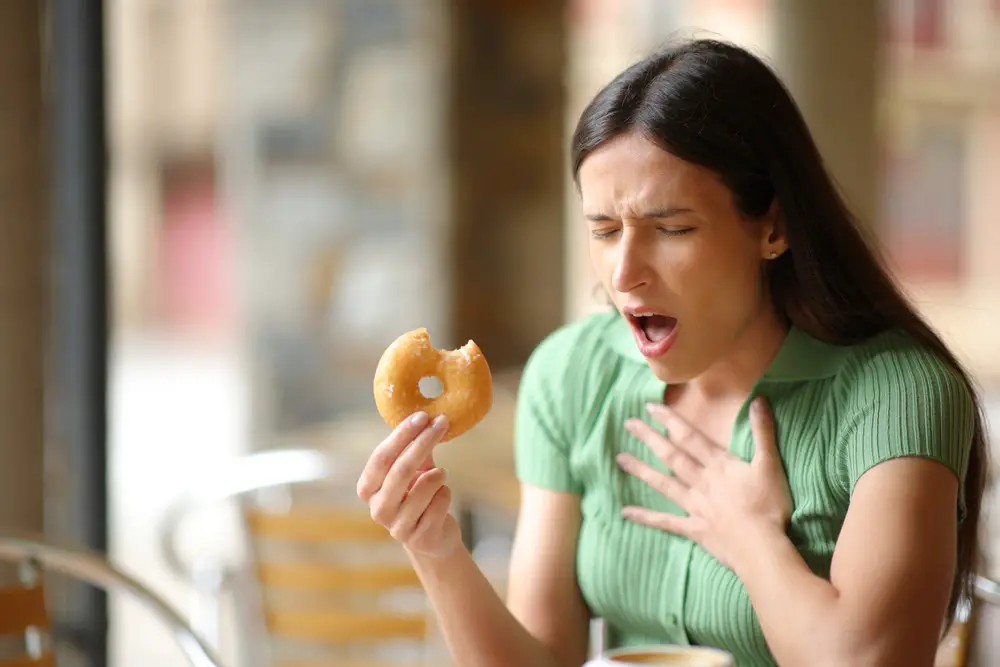After a meal, most people feel relaxed and satisfied. However, for some individuals, the moments after eating can be filled with unease and apprehension, leading to a condition known as “Post-Meal Anxiety.”
In this article, we explore the causes and coping strategies associated with this lesser-known yet significant issue. By uncovering the triggers and navigating the emotional terrain of post-meal anxiety, we discover how it can impact one’s mental health. We also share valuable insights into how to reclaim these moments as a source of well-being and contentment.
Understanding Post-Meal Anxiety

What is Post-Meal Anxiety?
Post-meal anxiety is a condition characterized by feelings of anxiety, unease, or distress that occur after eating a meal.
- Definition and Symptoms
Post-meal anxiety is defined by the emotional and psychological discomfort experienced after eating. Common symptoms include restlessness, nervousness, gastrointestinal discomfort, and a general sense of unease.
- Common Triggers
Understanding common triggers of post-meal anxiety is crucial. These triggers can include specific foods, social situations, or even the act of eating itself.
- Relation to the Digestive System
Post-meal anxiety can be closely related to the digestive system. Discomfort or irregularities in digestion can contribute to anxiety after eating.
Potential Causes of Anxiety After Eating
- Blood Sugar Fluctuations
Rapid spikes and crashes in blood sugar levels can lead to feelings of anxiety and irritability after eating.
- Food Sensitivities
Food sensitivities or allergies can trigger anxiety after eating certain foods. Understanding and managing these sensitivities is essential for alleviating post-meal anxiety.
- Psychological Factors
Psychological factors, such as stress, past trauma, or negative associations with food, can contribute to post-meal anxiety. Exploring these underlying psychological causes is crucial for effective coping strategies.
Link to Other Digestive Disorders
The relationship between post-meal anxiety and other digestive disorders, such as Irritable Bowel Syndrome (IBS) or Gastroesophageal Reflux Disease (GERD), is often intricate and multifaceted.

Post-Meal Anxiety and IBS:
Post-meal anxiety and IBS often share symptoms like abdominal discomfort, bloating, and changes in bowel habits. These overlapping symptoms can contribute to heightened anxiety after eating for individuals with IBS. The chronic nature of IBS can lead to heightened stress and anxiety levels, which, in turn, can exacerbate post-meal anxiety. The fear of triggering IBS symptoms during or after a meal can create a cycle of anxiety.
Post-Meal Anxiety and GERD:
GERD, characterized by acid reflux, can trigger anxiety during and after meals due to the discomfort and potential embarrassment associated with reflux symptoms. Anxiety can worsen GERD symptoms by increasing stomach acid production and making the lower esophageal sphincter (LES) more prone to relaxation. This, in turn, can lead to more frequent and severe episodes of acid reflux.
In both cases, addressing the relationship between post-meal anxiety and digestive disorders requires a comprehensive approach that considers physical and psychological aspects. This may involve dietary adjustments, stress management, medication when necessary, and possibly counseling or therapy to address the emotional component.

Coping Strategies and Lifestyle Changes
Practical Tips for Managing Anxiety After Meals
Managing anxiety after meals requires a multifaceted approach encompassing coping strategies and lifestyle changes.
- Mindful Eating Practices
Slow, Conscious Eating: Practice mindful eating by savoring each bite, chewing slowly, and paying attention to taste, texture, and aroma.
Limit Distractions: Focus on the meal to enhance the mind-body connection and reduce anxiety triggers.
Breathing Exercises: Incorporate deep breathing exercises before and during meals to calm the nervous system and alleviate anxiety.

- Portion Control and Meal Timing
Balanced Meals: Opt for balanced meals that include a variety of nutrients, such as protein, fiber, and healthy fats. This can help stabilize blood sugar levels and reduce anxiety-inducing spikes and crashes.
Portion Awareness: Be mindful of portion sizes to prevent overeating, which can lead to discomfort and anxiety. Listen to your body’s hunger and fullness cues.
Regular Meal Times: Establish regular meal times to create a predictable eating routine. Consistency can help reduce anxiety associated with uncertainty.
- Hydration and Exercise
Stay Hydrated: Drinking enough water throughout the day can aid digestion and reduce the risk of discomfort.
Light Physical Activity: Engage in light physical activity, such as a short walk, after meals to promote digestion and relaxation. Avoid vigorous exercise immediately after eating.
Stress Reduction: Incorporate stress reduction techniques like yoga or meditation into your daily routine to manage anxiety levels during and after meals.
By implementing these practical tips, individuals can better manage post-meal anxiety and eating disorders, promote digestive well-being, and enhance their overall quality of life.
Dietary Modifications to Reduce Anxiety
- Identifying Food Triggers
Food Diary: Maintain a food diary to track meals and any subsequent anxiety symptoms. This can help identify specific foods or ingredients that may trigger post-meal anxiety.
Common Culprits: Be aware of common anxiety-inducing foods such as caffeine, excessive sugar, processed foods, and high-fat meals. Reducing or eliminating these items may alleviate symptoms.
Food Sensitivity Testing: Consider food sensitivity testing if certain foods consistently lead to discomfort or anxiety. Identifying and avoiding trigger foods can be highly beneficial.
- Balanced Meals
Balanced Macronutrients: Eat meals that balance carbohydrates, proteins, and healthy fats. This balance helps stabilize blood sugar levels, reducing the risk of anxiety-inducing fluctuations.
Fiber-Rich Foods: Incorporate fiber-rich foods like whole grains, fruits, and vegetables into your meals. Fiber aids in digestion and provides a steady release of energy, reducing the likelihood of post-meal anxiety.
Lean Proteins: Choose lean protein sources such as poultry, fish, tofu, or legumes. Protein helps with satiety and can prevent overeating, which may lead to discomfort and anxiety.
Also Read: 4 Ways Resilience Acts as a Buffer Against Mental Health Conditions
- Nutrient-Rich Foods
Antioxidant-Rich Choices: Include foods rich in antioxidants, such as berries, leafy greens, and nuts. Antioxidants may have a calming effect on the nervous system.
Omega-3 Fatty Acids: Incorporate sources of omega-3 fatty acids, like fatty fish (salmon, mackerel), flaxseeds, and walnuts. These can potentially reduce anxiety symptoms.
Herbal Teas: Herbal teas like chamomile, lavender, or peppermint can have soothing properties and help alleviate anxiety after meals.
Dietary modifications tailored to individual needs can play a significant role in reducing post-meal anxiety. Identifying trigger foods, prioritizing balanced meals, and incorporating nutrient-rich choices can promote both digestive health and emotional well-being.

Tips for Dining Out
Eating out at restaurants or attending social events can present unique challenges for individuals with post-meal anxiety. Here are some tips to make healthy and anxiety-reducing choices in such situations:
- Plan Ahead: Review the menu online before going to the restaurant. This can help you choose options that align with your dietary preferences and anxiety management goals.
- Choose Mindfully: Opt for menu items less likely to trigger anxiety, such as grilled or steamed dishes, lean proteins, and vegetable-based sides.
- Portion Control: Consider sharing a meal or ordering an appetizer-sized portion if the regular portions are large. Smaller servings can help prevent overeating and post-meal discomfort.
- Hydration and Beverage Choices: Stay hydrated by drinking water throughout the meal. Avoid excessive alcohol or caffeinated beverages, as they can exacerbate anxiety symptoms.
- Mindful Eating: Practice mindful eating techniques, even when dining out. Slow down, savor each bite, and heed your body’s hunger and fullness cues.
- Communication: Don’t hesitate to communicate your dietary preferences and needs to the restaurant staff. Many restaurants are accommodating and can make adjustments to accommodate your requirements.
- Avoid Pressure: Don’t feel pressured to eat dishes that make you uncomfortable or anxious. Choose meals that align with your well-being, even if others at the table are making different choices.
- Take Breaks: Take short breaks during the meal to check in with your body and assess your comfort levels. This can help prevent the onset of anxiety.
By incorporating these tips, you can make dining out a more enjoyable and anxiety-reducing experience while allowing you to avoid any panic attacks and focus on the food and social aspects of the occasion.

When to Wave the White Flag: Signs You Need Professional Help
There’s no shame in seeking help when life’s stressors overwhelm you. The truth is, sometimes, issues like post-meal anxiety need a professional touch. Keep an eye out for these signs:
- Persistent Worry: If your post-meal anxiety becomes a regular guest that overstays its welcome, that’s a red flag.
- Interfering with Life: When anxiety affects your work, relationships, or overall happiness, it’s time to ring the alarm.
- Physical Symptoms: Racing heart, dizziness, and digestive problems after eating. Your body is screaming for help.
- Past Help hasn’t Helped: Tried self-help techniques, consulted Dr. Google, and leaned on friends, but still struggling? Maybe you need an expert’s touch.
The Roadmap to Recovery: Setting Goals
Goal-setting is your compass in the murky waters of anxiety. Specific, achievable targets give you direction and purpose. Here’s how to get started:
- Self-Assessment: Take stock of your current situation. Where does the anxiety stem from?
- SMART Goals: Make your goals Specific, Measurable, Achievable, Relevant, and Time-bound.
- Little Wins: Celebrate your small victories. Managed to sit through a meal without freaking out? High five to you!
- Accountability: Share your goals with a trusted friend, family member, or healthcare provider. They can offer support and keep you on track.
Tracking Your Path: Monitoring Progress
How do you know you’re making strides if you’re not keeping score? Monitoring your progress is like laying down footprints in the sand—each step records your journey.
- Journaling: Document your feelings, challenges, and triumphs. It’s enlightening to look back and see how far you’ve come.
- Milestones: Identify key markers in your recovery process. Give yourself a well-deserved pat on the back every time you hit one.
- Feedback Loop: Regularly consult a healthcare provider to assess your progress and adjust as needed.
- Mindfulness: Practicing mindfulness can help you become aware of your feelings and thoughts, making it easier to pinpoint areas for improvement.
There you have it! Recognizing when to seek professional help, setting realistic goals, and tracking your progress can empower you to combat post-meal anxiety effectively. Remember, the path to a calmer you is not a sprint; it’s a marathon. But with determination, the right tools, and perhaps a little professional guidance, you can reclaim the peace and joy that should come after every meal.
Frequently Asked Questions (FAQs)
How common is anxiety after eating, and is it usually serious?
Anxiety after eating is relatively standard, but its severity varies among individuals. While it is usually not serious, persistent or severe post-meal anxiety should be addressed and discussed with a healthcare professional.
Can certain types of foods trigger post-meal anxiety more than others?
Yes, certain foods, such as those high in caffeine, sugar, or processed ingredients, can trigger post-meal anxiety more than others.
Is there a connection between anxiety after eating and anxiety disorders?
There can be a connection between anxiety after eating and anxiety disorders. Individuals with anxiety disorders may be more prone to experiencing anxiety after meals, and managing their overall anxiety may also help alleviate post-meal anxiety.
Jacob Maslow
After surviving the traumatizing events of 9/11, I took it upon myself to heal through helping others. I’m the primary caregiver of my children and understand from first-hand experience the lonely paths you have to walk as a partner and parent when leaving an unhealthy relationship.
We’re all echoing in a dark space that doesn’t have to be this empty, and that’s been my mission since finding solace and recovery in therapy: To help comfort others who are still in shock and at the prime of their struggle.
I came across BetterHelp after searching for this type of community. I wanted to belong to a body of proactive therapists and supportive therapy veterans that allowed me to see other sides of the story.
It was unconventional, and that’s what attracted me most. During my most challenging times, when my ex-wife completely cut me off from my children, I found comfort and clarity through BetterHelp.
Instead of being chained to a strict therapist recommendation, I was in charge of who I felt understood my struggle most. That allowed me to find my true peace, as I was reunited with those who read behind my words and had first-hand experience with my trauma.
Recovery is a choice; with BetterHelp, that choice will be a few clicks away. You can join their couples-oriented platform, Regain.us, for those stuck with family estrangement and toxic relationship patterns.
- Left Arm Pain and Anxiety: Understanding the Relationship - November 23, 2023
- Anxiety Paralysis: Coping with Overwhelming Stress - November 23, 2023
- Anxious vs. Nervous: Differentiating Emotions and Responses - November 15, 2023
This site contains affiliate links to products. We will receive a commission for purchases made through these links.




